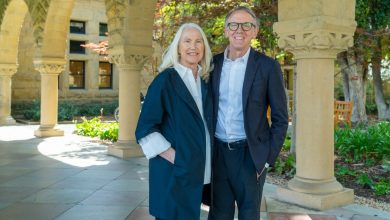Adults Who Left College Without a Degree Could Be Key to Recovering Enrollment

When she walks across the stage next May to receive her bachelor’s degree at Morgan State University, she’ll join a growing number of returning adult students who are being lured back by programs designed specifically for people like them.
The skills Vanderloop learned on the job as her interests shifted from pre-med to health-care technology will apply toward her degree. So will 90 of the 102 credits she accumulated, one or two courses at a time, while winding her way through college as a working single mom. An adviser helped her design a degree path that integrated her job skills and studies, saving several semesters’ worth of tuition and time.
What’s happening at Morgan State reflects an emerging trend in higher ed nationwide as advisers and registrars reach out to former students and help piece together fragments of launched and abandoned college careers.
The number of people who began college but left without a credential grew to 39 million in 2020, up nearly 9 percent in two years. That represents more than one in five people in the United States over age 18, according to a report released this year by the National Student Clearinghouse Research Center. Re-engaging them can help narrow equity gaps, given that students of color and low-income students are far more likely to stop out of college, a trend that was heightened during the pandemic. And studies have shown that college credentials improve people’s job prospects and earning potential over a lifetime.
But diving deeper into this pool of potential applicants could also be a matter of institutional survival for some colleges. As the number of traditional-age college students continues to shrink, contributing to worsening enrollment slides, colleges nationwide are doubling down on efforts to re-enroll those who already have a head start toward a degree.
“These are students who have, for whatever reason, had to stop out — maybe they had a baby or had to take care of parents or had to work full time,” said Nicholas Vaught, a student-success administrator at Morgan State. While they may doubt themselves, “we’re not viewing them as failures,” he added. The fact that they earned college credits, he said, makes them successes.
As a historically Black college that’s enjoyed a surge in attention and enrollment in the past few years, the Baltimore institution isn’t seeking out students like Vanderloop primarily to fill seats, he said. The focus now is more on equity and making sure more students get the benefits of completing degrees. In Baltimore, 43 percent of white households — but only 16 percent of Black households — have a bachelor’s degree or higher, according to a 2021 report from the Samuel DuBois Cook Center on Social Equity, at Duke University.
Longer term, and more broadly across higher education, though, the number of older adults who have stopped out of college will continue to grow, Vaught said, “even as we see the number of 18-year-olds decline.”
Despite the pandemic, more than 944,000 people with some college but no credential re-enrolled during the 2020-21 academic year, and more than 60,000 earned their first postsecondary credential, the report from the National Student Clearinghouse noted. Six out of 10 who re-enrolled in 2019-20 either continued to the following year or got a credential within a year of returning.
For many students who stopped out because of work or family responsibilities, money is still tight, time stretched thin, and self-confidence in academic abilities low. They may also still be paying off student loans.
“We know that when students have some credit, no degree,” Vaught said, “that also means some college debt but no degree.”
Then, there are logistical challenges, like small unpaid balances for tuition or library fees that leave students with financial holds that prevent release of their transcripts. Some colleges have dropped such holds, which disproportionately block low-income students’ access to college.
Despite these challenges, with many colleges “still reeling from historic enrollment declines during the pandemic,” the Clearinghouse report notes, “the continued health of higher education institutions, and their ability to meet the needs of future students, may depend on their success at re-engaging” these stopped-out students.
Morgan State found that retrofitting existing degree programs to meet the needs of returning adults didn’t work. These students are more likely to bring in credits from multiple colleges, work experience they could get credit for, and complicated lives that need to be factored in when scheduling classes and workloads.
To tailor college more specifically to them, the university this spring started a College of Interdisciplinary and Continuing Studies as an outgrowth of an applied liberal-studies major begun five years ago. The new college, where Vaught serves as interim assistant dean of academics and student success, offers online classes to students around the country at in-state prices.
Its interdisciplinary focus makes it easier for students from a variety of work backgrounds to advance within their current jobs or pivot to a related but new field, said Nicole M. Westrick, dean of the new college. Students can test out of certain courses through credit for prior learning, which involves evaluating how skills learned on the job could be applied to their degree programs. The university has been learning from institutions that have well-established programs for granting such credit, Westrick said, places like Central Michigan University.
Vanderloop is among the returning students who benefited from that approach. Morgan State applied 18 credits for work she’s done in the health-care field and accepted nearly all of the credits she brought in, she said, “so I didn’t feel I was having to start over.”
She first enrolled at Eastern Michigan University in 2008. Like so many returning adults, her college career took a bumpy, interrupted route over the next decade. A new mother, she had to stop out in 2009 when her husband’s military post was transferred to Colorado. A few years later, divorced, she moved back to Michigan with her young daughter, hoping to re-enroll at Eastern Michigan. First stop was enrolling at a community college to make up for her earlier poor grades and qualify to transfer.
“As a single mom, trying to get financially back on my feet, I had to prioritize work over studies, and my studies suffered,” she said. “Taking a class here and there, I eventually earned an associate degree” in 2020 from Washtenaw Community College. By then, she was living in Maryland, where she’d moved for her job at a health-care software company. Learning that Morgan State’s program would allow her to graduate by next spring with a concentration in interdisciplinary engineering, information, and computational sciences, she eagerly enrolled.
A 2018 study by the policy research group California Competes found that just half of Latino, Black, Native American, and Pacific Islander adults in that state who attended college ended up earning degrees, compared with two-thirds of white adults. To lower barriers for returning students, the Dominguez Hills program waived application fees, offered online orientations, and scrapped the requirement that students submit a letter of intent to register for classes.
More than 600 students filled out re-entry forms indicating they’re planning to enroll this fall. Still, it’s hard to predict how many students might change their minds when they haven’t gone through the formal, time-consuming process of reapplying for their seats and paying fees.
Someone who’s doing fairly well financially may not see the immediate value of returning to college but might be persuaded to return if flexible part-time options, wraparound supports like child care, financial aid, and tutoring are available. “A student earning $25 an hour on the job and supporting a family might want to ease back into college a class or two at a time,” Sanders said.
She didn’t realize that if she’d withdrawn from her courses, she could have avoided being saddled with the low grades that stuck to her transcript. In order to finish her bachelor’s degree, she has to regain good academic standing through courses she’s taking in an “Open University” run by the Dominguez Hills campus that’s available to working adults and others who aren’t formally admitted to the university. Credit courses are offered, on a space-available basis, to students who want to take classes for personal development, are academically dismissed, late to applying to the university, or come from another university to complete one course.
Once her academic standing is restored, Harris might qualify to have some of the law-enforcement academy classes she took to become a deputy sheriff for Los Angeles County applied toward her degree.
To earn such credit, students can submit a portfolio, paper, test, or other way of showing department faculty that the skills and trainings they’ve gained on the job correlate to learning or competencies. But granting academic credit for work experience requires convincing faculty members that the two are comparable. No one wants to “give away” degrees, Sanders said. She understands the need for rigor and standards, but she also feels that flexibility and a chance to prove a student has gained necessary knowledge is crucial. Otherwise, she said: “What are we measuring? Hours in seats or competencies and skills?”

Delcan & Co. + Danielle Del Plato for The Chronicle
The university’s president, Thomas A. Parham, said people who come from less-privileged backgrounds often have to defer goals like college to meet more immediate needs like paying rent or putting food on the table. “Part of what we want to do, not just on our campus but across the CSU system, is provide opportunities to recapture some of those students, to assess what it is that derailed their trajectory toward completion, and see if we can’t put some services in place that help position them for success,” he said. When setbacks threaten to push them off course again, “We’re working hard to convince them that they really do belong in this educational space and that they have what they need to finish.”
This applies, Sanders said, to the single mom with a 1-year-old and no child care during the pandemic who said she “tried and tried but just couldn’t do it.” Likewise, the working student who left college a few years ago when his mother had cancer and needed his support. When the university reached out to him, Sanders said, “the nudge motivated him to come back.”
Advisers who stay with the student and check in regularly, from application to graduation, are essential elements of the strategy at both Dominguez Hills and Morgan State. Deborah Hargrave, an academic-retention adviser at Morgan State, can relate to her advisees. She was 29 when she first enrolled at Morgan State in 1995, married with three kids. She dropped out during her sophomore year to work full-time, trying again in 2002 for a semester. “Our kids always came first,” she said, and without two full-time incomes, she and her husband couldn’t keep them in private schools. In 2011, at her oldest daughter’s urging, she re-enrolled in Morgan State, earning a bachelor’s degree in sociology in 2015 and a master’s in 2020.
Hargrave remembers feeling self-conscious returning when she was in her 40s, wondering “if the younger kids will look at me funny if I ask too many questions or if the professor is going to be annoyed with me.” Her adviser, a returning student himself, became a longtime mentor. He referred her to financial help and to tutoring labs, “because it had been a moment” since her last chemistry course and the prospect of picking it up again filled her with dread. Like her mentor, she now starts out sessions with her own advisees by asking about their families and jobs and how they’re doing outside their classes. She reminds them they can lean on one another, and she urges them to mentor younger students interested in their career fields.
That kind of personal outreach has given Tara Williams the confidence that she’ll be able to complete her bachelor’s degree more than a decade after she started. She earned an associate degree in 2011 and enrolled at the University of Phoenix six years later to try to finish a B.A. By 2019, with a full-time job, family, and around $70,000 in student loans to pay back, she said, “I ran out of funds.” She had to drop out.
Now, at age 52, she’s enrolled at Morgan State, hoping to graduate in December 2023 with a B.A. in interdisciplinary organizational development. “I hated that stuck feeling,” she said. “I was determined that no matter what age, I would go back and finish.”
Source link







